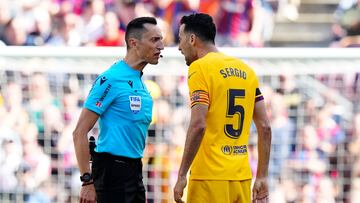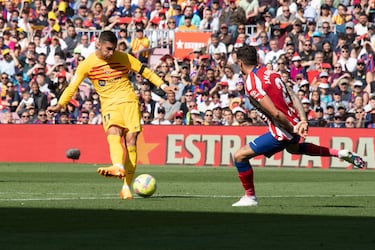Why was Busquets’ handball against Atlético Madrid not given? VAR explanation
A subtle rule from both FIFA and UEFA prevented the referee from blowing for an Atlético Madrid penalty at Camp Nou.

Handballs seem to be the main talking topic of every match day in LaLiga. The last player to find themselves in an unnatural position was FC Barcelona’s Sergio Busquets, who, in minute 90 of Barça’s 1-0 win against Atlético Madrid, saw the ball clearly hit his arm.
Despite the outstretched position of the player’s limb and the unequivocal contact made with the ball, referee Sánchez Martínez had his reasons for not blowing for a dramatic, last-minute penalty, as did VAR for not intervening in the angry Atlético aftermath. The rules are written down on paper, but the subtleties make the situation complicated and as such, a huge debate is often generated.

Koundé's touch was key to the decision
The decision of both the referee and VAR is deemed as correct as it complies with one of the premises that makes the offence non-punishable. The start of the action sees a headed clearance from Koundé bounce first off Giménez and then onto Busquets’ outstretched, ‘unnaturally’ placed arm.
The key to the decision, perhaps surprisingly, has nothing to do with the position of the Barça captain’s arm, but the fact that Koundé played the ball before it hit Giménez. Were it not for the Barça defender playing the ball, it would have been given as a penalty.

What is the official FIFA rule on handball?
Related stories

Barça can see the title date

Xavi’s Barcelona reaches 150 goals
In the refereeing guidelines, that referees, clubs and players all receive at the beginning of every season, there are points that prevent certain types of handballs from being given, one of which is applicable to the decision in Barça’s win.
“It is not considered an infraction if the ball accidentally makes contact with a defender’s hand/arm inside their penalty area from a deflection, a teammate’s clearance, or similar”, says FIFA’s official rulebook - exactly what happened in the game. The ruling is not just used in Spain but across Europe and the world, as it is both a UEFA and FIFA rule. Football, it’s simple!